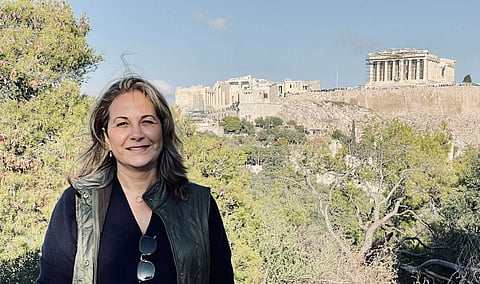

Lara Barazi-Geroulanou is CEO of Kefalonia Fisheries since 1998. Before, she worked in investment banking and trading in the US. She is president of the Federation of European Aquaculture Producers (FEAP), a member of the board of the Benaki Museum, and, the advisory board of the Blue Revolution Fund. Also, she consults to the Food and Agriculture Organization of the United Nations (FAO) and the International Union for the Conservation of Nature (IUCN) on issues of sustainable aquaculture development.
And if all this were not enough, she was appointed the first female president of the Federation of European Aquaculture Producers and the company she leads has just joined the Spanish seafood Profand group that will reinforce not only its international expansion but also its vertical integration in aquaculture species. Women like her pave the way for the younger ones and make the sector richer and without any doubt more exciting.
The early years were very experimental and were characterized by an innovative and creative spirit. It was a completely new industry and in the first years, everything in Kefalonia was new and waiting to be built. A fantastic team integrated with young and creative people decided to move to the island and be part of this project. Today of course there is a well-established sector and company with many differences in terms of technology and system, but our Kefalonia team today are just as innovative, educated and with the same curiosity as the founders. We work hard to keep that innovative spirit together with the benefits of long experience and tradition.
As the Chief Executive Officer, I manage the overall operations of the company. My main role is to forge the vision and direction of the company and then of course inspire and motivate our teams to implement that vision. I am responsible for making sure that all of the departments have the resources they need to do their job and a great part of that is ensuring that the right people with the right skills and training are in place. I keep in touch with all of them with special emphasis on sales, finance, production, and research and development.
I see two main challenges for the industry: the first is the need to develop in a sustainable manner, to increase our contribution to the circular economy. We have been concerned with the sustainability of our raw materials for the last decade at least so we are starting to see the availability of alternative, more sustainable raw materials at commercial size which is very positive. Aquaculture is already the most sustainable production method for protein production but we must continue to minimize our footprint and increase our contribution to a greener, healthier society.
The second challenge, climate change, is for me a bigger concern, because I feel that we are late in thinking about how it will affect us and how we can go about mitigating it. Climate change is having immediate effects on food production in general and this is also true for aquaculture; we see increasingly extreme weather phenomena, changes in average ocean temperatures and environmental conditions and of course all of this will also have effects on our raw material inputs. The challenge is great and we will need to devote our best resources to finding solutions.
I have to say that for every woman in any sector, this is not easy. The challenges I have faced were mainly around finding balance between the demands of my job and my responsibilities as a mother. Although we have come a long way, there is still much work to be done in making our industry and companies attractive to women, a place where they can feel valued and encouraged and where they can have the support they need. There is still a lot of work to do. We often have more responsibilities and challenges to face than men and this makes things hard. The positive side is that I see more and more young women joining the industry and more and more remarkable women in leadership positions.
Needless to say the human factor is the most important thing in any endeavor. For me personally, I have been fortunate to have had a number of extraordinary mentors, people who have been close to me, who have generously supported me throughout my career. This has taught me the value of human relationships and the importance of cultivating the skill of communication and connection with friends, colleagues and even competitors. In the aquaculture industry in particular, we still depend very much on the human factor no matter how sophisticated our systems are. We rely on our best people to watch over the health and well being of our animals in the field as well as on our teams to tackle the increasingly complex challenges of our industry.
Kefalonia Fisheries SA was founded by Marinos Geroulanos, a fourth-generation Kefalonian, in 1981. This was the very first farm for the production of European Sea Bass (Dicentrarchus labrax) and Gilthead Sea Bream (Sparus aurata) in Kefalonia, Greece. He aimed to preserve the traditional way of life of the island through an innovative and sustainable professional practice, namely aquaculture.
More than three decades later, Kefalonia Fisheries SA remains committed to excellence in the premium seafood markets. They strive to produce and deliver the freshest, highest quality Sea Bass and Sea Bream throughout the world. Their aim is s to preserve the heritage, purity and unique flavor of the Mediterranean.
